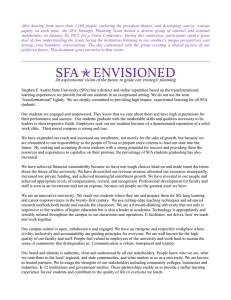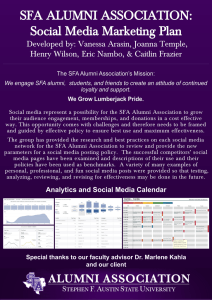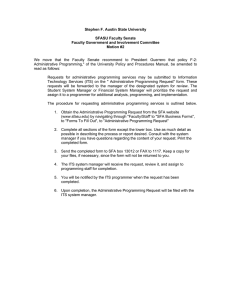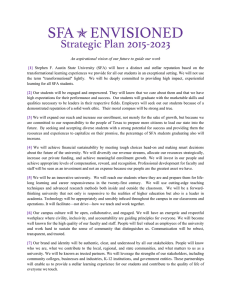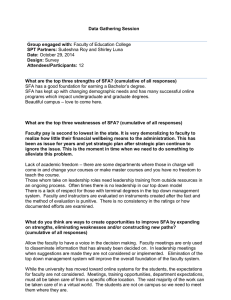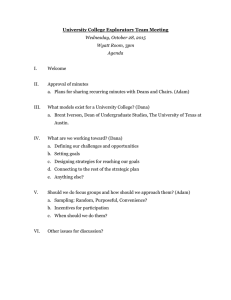University College Exploratory Team Meeting Wednesday, October 21, 2015 Wyatt Room, 3pm Agenda
advertisement
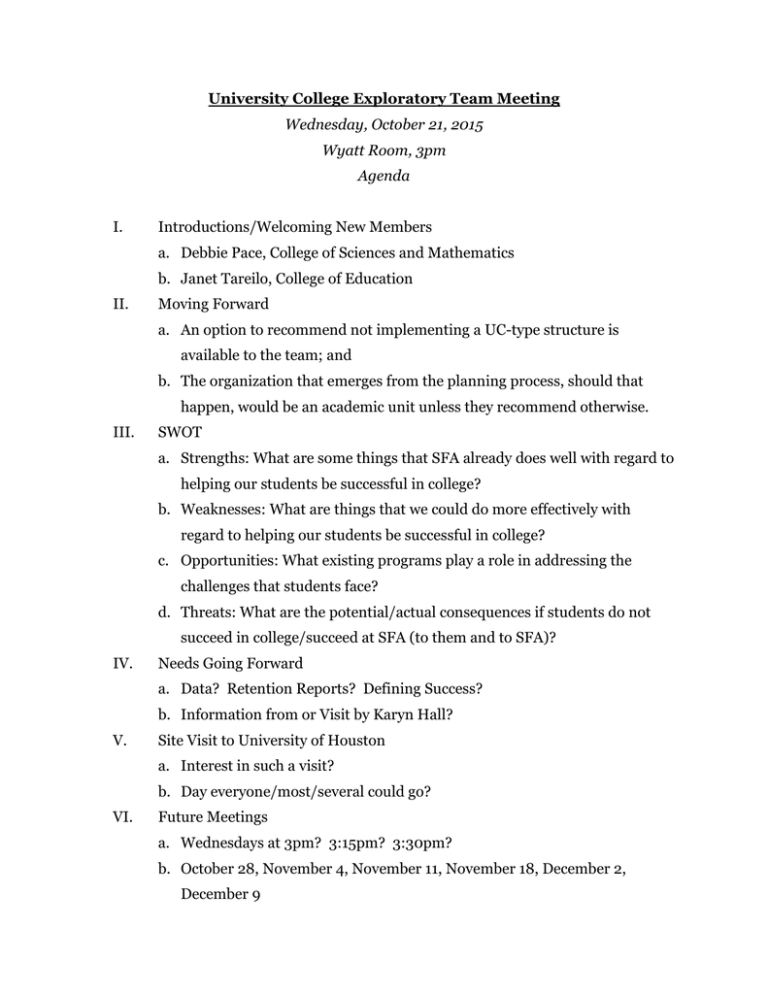
University College Exploratory Team Meeting Wednesday, October 21, 2015 Wyatt Room, 3pm Agenda I. Introductions/Welcoming New Members a. Debbie Pace, College of Sciences and Mathematics b. Janet Tareilo, College of Education II. Moving Forward a. An option to recommend not implementing a UC-type structure is available to the team; and b. The organization that emerges from the planning process, should that happen, would be an academic unit unless they recommend otherwise. III. SWOT a. Strengths: What are some things that SFA already does well with regard to helping our students be successful in college? b. Weaknesses: What are things that we could do more effectively with regard to helping our students be successful in college? c. Opportunities: What existing programs play a role in addressing the challenges that students face? d. Threats: What are the potential/actual consequences if students do not succeed in college/succeed at SFA (to them and to SFA)? IV. Needs Going Forward a. Data? Retention Reports? Defining Success? b. Information from or Visit by Karyn Hall? V. Site Visit to University of Houston a. Interest in such a visit? b. Day everyone/most/several could go? VI. Future Meetings a. Wednesdays at 3pm? 3:15pm? 3:30pm? b. October 28, November 4, November 11, November 18, December 2, December 9 c. Will make every attempt to reserve the Wyatt Room for consistency University College Exploratory Team Meeting Wednesday, October 21, 2015 Meeting Notes In attendance: Adam Peck, Dana Cooper, Deborah Pace, Debra Kiesel, Janet Tareilo, John Moore, Karen Embry-Jenlink, Keith Hubbard, Kenneth Collier, M. E. McWilliams, Mark Barringer, Matthew McBroom, Michael Martin, Michael Tkacik, Michael Walker, Ann Wilson, Scott Shattuck, Timothy Clipson and Joy Hammonds (note taker). I. Introductions/Welcoming New Members a. Debbie Pace, College of Sciences and Mathematics b. Janet Tareilo, College of Education II. Moving Forward a. Dana Cooper & Adam Peck reiterated that the purpose of the committee is to develop a consensus for the need for a UC and recommendations on the structure. The following clarifications were made: i. The option to recommend not implementing a UC-type structure is available to the team. ii. The organization that emerges from the planning process, should that happen, would be an academic unit unless they recommend otherwise. iii. The assumption at this point is that the recommended entity would be reporting through Academic Affairs. iv. All need to operate on the assumption of good faith among the members. III. Materials providing insight into various structures of UCs were distributed to the group. IV. S.W.O.T. a. The lists below was gained through group discussion. b. Strengths: What are some things that SFA already does well with regard to helping our students be successful in college? i. AARC ii. Noel Levitz/NSSE iii. Institutional Research iv. SFA 101 v. Faculty vi. Small first year classes vii. Residence halls viii. STEM ix. Advising for undeclared majors x. Honors, meeting students’ academic needs xi. Cohort building xii. Engaging Campus, Student Affairs Staff & Programing c. Weaknesses: What are things that we could do more effectively with regard to helping our students to be successful in college? i. Lack of consultation and communication ii. Major jumping/college jumping iii. How to identify and reach those who need us the most but don’t want us iv. No common freshman experience v. Losing communication with probation/suspension students vi. Cumbersome administrative structures vii. Poor processes and bureaucratic barriers at every turn, for the students viii. Simplicity in advising/scheduling process and creating a clear and transparent path to graduation for the students 1. Lack of consultation across campus 2. “If collaboration isn’t part of the process then technology is not going to solve the problem” ix. Note: The group discussed that there is often overlap between strengths and weaknesses. d. Opportunities: What existing programs play a role in addressing the challenges that students face? How can we capitalize on these advantages to help students meet their goals? i. Institutional collaboration of early college 1. Increasing numbers of student with the equivalent of an associate’s degree 2. Requires increased individual focus ii. Establish success marker/benchmarks based on our students iii. Assessment redesigns iv. Create academic maps v. The strength of the Honors College vi. Living Learning communities vii. Office of Multicultural Affairs 1. Opportunity to reach students/to be inclusive/to be culturally responsive viii. We need a “Dean of Customer Service/Student Ombudsman” 1. Ask me for help, ability to mobilize resources e. Threats: What are the potential/actual consequences if students do not succeed in college/succeed at SFA (to them and to SFA)? i. Reputation ii. Recruitment iii. Resources iv. Community Colleges v. Choice of 2 year over 4 year vi. Economy vii. Practical generation viii. Demoralized and/or frustrated faculty ix. Unfunded mandates x. Targeted program(s) for probationary students V. Needs Going Forward a. Data Needs: i. Developmental student retention/persistence by college/major ii. 2 semester success rate of remedial students iii. Early college credit for FTFT iv. Breakdown cohorts of risk groups v. Focus group 1. GenJacks / Honors 2. Year two spectrum vi. Exit interviews with “exit-er” VI. Site Visit to University of Houston a. A site visit is being planned with Dana Cooper VII. Future Meetings a. Wednesdays at 3:15pm b. October 28, November 4, November 11, *November 18, December 2, December 9 c. The Wyatt Room is reserved for every meeting except November 18th. A meeting location will be announced soon.
